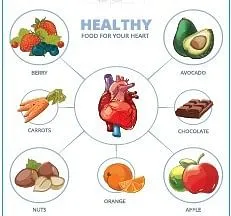Many senior citizens and their families after getting a heart attack come and ask the doctor regarding healthy diet and then follow it. While it is useful but then at this stage it is now a secondary preventive measure. It certainly has its utility in preventing recurrences. Making a habit of consuming Heart healthy diet from early life is the key to prevent or minimise chances of getting a heart attack and its complications. This is called primary prevention.
Many of us know that “Heart healthy Diet” has an important role to play in keeping us healthy but since habits die hard, intake of such a diet remains poor and needs a lot of motivation. It is however, never too late to change and supplement the existing diet with food items which have been scientifically proven for their heart protecting properties.
1. Eat more Vegetables and Fruits
Fruits and vegetables are rich in vitamins, minerals, antioxidants, and fiber, and are low in calories and cholesterol. They can help you feel full and reduce consumption of high-fat foods. Keep fruits visible and within reach to encourage consumption, and incorporate them into meals as the main ingredient. Eating 5 to 6 servings per day can protect against heart attacks.
Vegetables and Fruits to be chosen: Eat fresh seasonal fruits and green leafy vegetables like apples, apricots, mango, peaches, cherry, pears, papaya, knol-khol, cabbage, cauliflower, eggplant, bhindi, gourd, etc. Avoid canned fruits, pre-cooked preserved foods, fruit juices, deep-fried vegetables, and fruit salads with cream or heavy syrups.
2. Select whole grains
Whole grains provide fiber and nutrients that regulate blood pressure and heart health. Swap refined grains for unpolished rice and whole wheat flour. In Kashmir, rice is a staple and should be limited to 100-150g per meal. Overweight individuals and diabetics should not exceed 50g. Whole wheat chapatis are recommended with vegetables, lean meat, and fruit. Baker’s bread made from Maida should be avoided. High carbohydrate diets lead to high triglycerides and diabetes. Avoid biscuits, muffins, cakes, white bread, white flour, and products made from them.

3. Limit unhealthy fats and cholesterol
High blood cholesterol, particularly bad cholesterol (LDL c), increases the risk of heart attacks. Diet contributes only one third to cholesterol levels, while the liver is responsible for the majority. To reduce saturated fat, limit solid fats such as butter and ghee, trim meat fat, choose lean meats, and consume chicken without skin. Fish is a better choice. Use healthy fats like olive, mustard, canola, and sunflower oils, with mustard oil being preferred in the valley. Avoid deep frying and discard leftover oil, which is full of unhealthy trans fatty acids and carbon products. Ghee, coconut oil, Palm oil, and hydrogenated oils like “Dalda” vanaspati ghee are bad for the heart.
4. Protein Sources should have low-fat
Choose lean meat, poultry, fish, low-fat dairy products, and egg whites for protein. Opt for lower-fat options like skimmed milk. Certain fish, rich in omega-3 fatty acids, can lower triglycerides. Legumes like beans, peas, and lentils are good substitutes for meat. Skimmed milk, yogurt, and paneer are good options, while full cream milk, organ meats, and fatty mutton should be consumed sparingly.
5. Reduce the sodium/salt in your food
High sodium intake can lead to high blood pressure and heart disease. Limiting sodium is crucial for a healthy heart. Healthy adults should consume no more than 2.5 grams of sodium daily. Those with high blood pressure, diabetes or chronic kidney disease should limit their intake to 1.5 grams. Traditional tea with salt (noon chaay) is high in salt and should be consumed sparingly, especially by those at high risk for heart problems.
6. Control the amount of food you eat:
The amount of food is as important as what you eat? Overloading your plate, and eating until you feel stuffed can lead to eating more calories, fat and cholesterol than you should. The serving size should be small. Keep track of the number of servings you have. Meat, chicken or fish should not be more than 75 to 100 grams per meal.
Tail Piece:
Consumption of multiple servings of fresh seasonal fruits, salads and vegetables per day leads to a marked reduction in vascular events. This habit should be combined with regular exercise, cessation of smoking, keeping blood pressure less than 140/90 mmHg, appropriate blood sugar control in diabetics, avoiding obesity and minimising psychosocial stress.
Heart healthy Diet is an important and integral part of the “No Heart Attack Mission” of the Gauri Kaul foundation. Preventive health checkups and dietary counselling is an important component of the services rendered by the foundation and its centres.
Author is Founder Director Gauri Kaul Foundation
Disclaimer: The views and opinions expressed in this article are the personal opinions of the author.
The facts, analysis, assumptions and perspective appearing in the article do not reflect the views of GK







